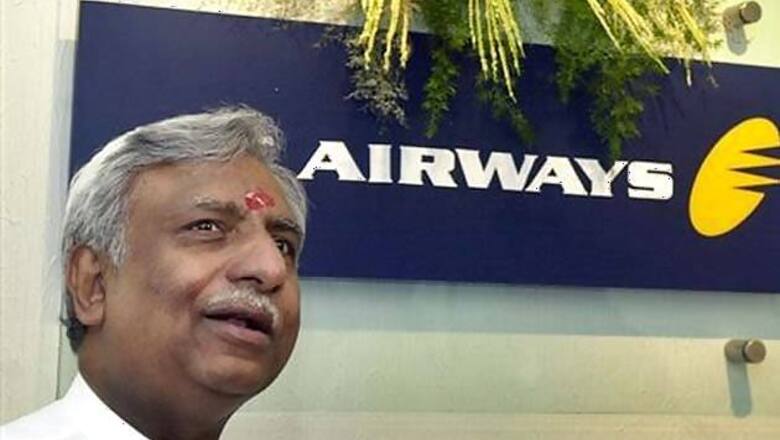
views
Those whose net worth eroded due to factors such as economic uncertainty, policy changes and, in some cases, sheer bad luck.
MG George, Muthoot Finance
#55 in 2012
At one point, Muthoot Finance was India's leading lender against gold. Revenues and profits had doubled last year, with the spurt in gold prices, taking their net worth to $1.14 billion. Then came the downer: The RBI ruled that the loan-to-value ratio had to be 60 percent, down from 80 percent. Muthoot's assets under management came under severe pressure; they have been stagnant since and the stock price has fallen from Rs 184 to Rs 102 (October prices) over the last year.
Gautam Thapar, Avantha Group
#60 in 2012
Gautam Thapar is among the most high-profile drop-outs from the Forbes India Rich List. The much feted founder and chairman of the Avantha group has struggled as both his flagship companies, Crompton Greaves and Ballarpur Industries, have reported declining profits.
Crompton Greaves has been hit by the slowdown in the power business; acquisition-led growth plans also didn't quite work. The company's shares had tanked five times more than the benchmark indices. Thapar has been trying to restructure the group by selling some of the European acquisitions and bringing in private equity. Market participants, however, continue to stay away from the counter. The Crompton Greaves stock price fell to Rs 100 in October 2013 from Rs 121 in October 2012.
As for Ballarpur Industries, while it is India's largest manufacturer of printing and writing paper, attempts to transform into a regional power have come to naught. Net profit for 2012-13 was Rs 6.57 crore on revenues of Rs 1,095 crore.
Jaiprakash Gaur, JP Associates
#70 in 2012
For two years now, the group's high leverage has affected the performance of almost all its businesses. Its problems are compounded by the economic slowdown which has hit the group's real estate, infrastructure and hospitality play. In October 2013, JP Associates had a total net debt of $10 billion (Rs 61,000 crore). Investors have since dumped shares, with the price dropping 68 percent from what it was during the same period last year, making it the worst performing stock on the CNX Nifty. In September, JP was able to sell its cement plant in Gujarat to UltraTech for Rs 3,800 crore. But that deal is a drop in the ocean at a time when interest costs per year are as high as Rs 5,000 crore. The one silver lining could be the 8,000-acre land bank, which the company claims is valued at Rs 70,000 crore.
Ramesh Chandra, Unitech
#82 in 2012
Worth over $11 billion at his peak in 2007, it has been a steady slide downward since for Ramesh Chandra who was valued at $695 million in 2012. The rough patch for the property developer began in 2011, after the telecom corruption scandal led to younger son Sanjay, the MD, being jailed for seven months. Trying to cut its $1 billion debt, Chandra is still in talks with private equity firms to sell its two special economic zones and an IT park.
Prathap C Reddy, Apollo Hospitals
#83 in 2012
The US-trained cardiologist has been going through a difficult time with stiff competition from national and regional players in the health care business. The Reddy family has pledged roughly half of the 34.35 percent stake it owns in the hospital company. However, liquidity is set to improve after a recently-concluded deal with PE firm KKR, to raise Rs 550 crore to help repay debt and stay on course for expansion.
Karsanbhai Patel, Nirma
#86 in 2012
Karsanbhai Patel, once the poster boy of Indian industry, has had a rough few years. With barely 10 percent market share, Nirma, the detergent powder it manufactures, is far from being a challenger to the MNC-led brands. The company delisted in 2011 and posted a Rs 61-crore loss in the 18 months leading to September 2012. Over the last year, nimble competitors like Jyothi Laboratories (which bought Henkel India) and Ghari have eaten into its share. Patel has handed over operations to his sons, who have expanded activities into pharma, chemicals, infrastructure and cement.
Krishna Kumar Modi, Modi Enterprises
#89 in 2012
A 37 percent drop in the share price of flagship company Godfrey Phillips capped a tough year for KK Modi. Despite an increase in revenues, rising costs have squeezed the company's margins with its net profits slowing down last year. It didn't help that Modi has been unable to pass on the rising taxation costs to customers. Personally, the patriarch of Modi Enterprises awaits the return of his son Lalit Modi, the former IPL commissioner, who is in a self-imposed exile in London. In 2011, Modi had annointed Lalit as his heir apparent but the latter is yet to take guard.
Naresh Goyal, Jet Airways
#94 in 2012
In the last year, the London-based founder of Jet Airways has had the worst run in the airline's 20-year history. Despite the bankruptcy of his bete noire, Vijay Mallya's Kingfisher Airlines, Goyal has been unable to have the last laugh. Costs are mounting and the sale of a 24 percent stake to Abu Dhabi carrier Etihad, which could bring in equity of about Rs 2,000 crore, is yet to go through. Jet's market dominance has been steadily undermined by low-cost carriers IndiGo and SpiceJet. Jet has a debt of Rs 12,000 crore; it has just reported a record quarterly loss of Rs 891 crore for the July-September quarter as against Rs 355 crore in the previous quarter.
There are more roadblocks on the horizon: Two new carriers, AirAsia India and Tata-SIA, are gearing up for a launch next year. The government is also liberalising bilaterals to allow more foreign carriers to operate to India. The market will only get bloodier. (It also doesn't help that Mallya continues to be on the rich list.)
Virendra Mhaiskar, IRB Infrastructure
#96 in 2012
Virendra Mhaiskar gets his fortune from a 60 percent stake in IRB Infrastructure, which builds and collects toll on roads and highways. The share price has taken a beating over the past year, falling to Rs 76 in October 2013 from Rs 117 in October 2012. The erosion is partly because of the slowdown in road project allocation by the government and also because of IRB's own troubles. The company had setbacks after commuters stopped paying toll at key roads including the Kolhapur BOT project. Mhaiskar was also being investigated for the murder of a Pune-based activist who had alleged that IRB had grabbed government lands.
The others no longer on the list:
TT Jagannathan, TTK Group
#87 in 2012
MAM Ramaswamy, Chettinad Cements
#88 in 2012
Ramesh Agarwal, Dainik Bhaskar
#95 in 2012
Anand Jain, Jai Corp
#98 in 2012
Onkar Kanwar, Apollo Tyres
#99 in 2012
Prithvi Raj Singh Oberoi, The Oberoi Group
#100 in 2012




















Comments
0 comment